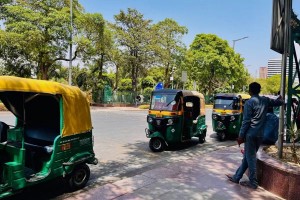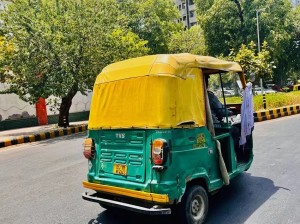Amid the relentless heat in the capital, the government advises against outdoor activities during the peak heat hours from noon to 4 p.m. to mitigate health risks associated with the scorching temperatures. However, auto rickshaw drivers in Delhi are unable to take refuge at home due to the demands of their occupation, which leaves them exposed to the elements and lacking in basic infrastructure.
As heat wave conditions prevail in Delhi and parts of north India, authorities have advised citizens to stay indoors or in the shade during the mid-day hours when the sun is the strongest and avoid strenuous activity from noon to 4 p.m., to protect themselves from heat stress-related illnesses. However, avoiding the summer heat is simply not an option for the auto drivers of Delhi as they need to continue working under these extreme conditions due to financial necessity. Their earnings are already facing a hit as fewer people are either stepping out or taking autos because of the heat.
“I simply can’t afford to remain idle despite the risks,” says Shukhjeevan Mishra, who has been driving the iconic green-yellow (hari-peeli) auto for nearly 25 years. “It is a matter of survival. I am the only earning member in my family.”
Mishra, who works from 10 a.m. to 9 p.m., shares how his income has taken a hit as there are not many customers on their road these days. “Our lives are on the road. We spend nine to 10 hours, if not more, on the road,” says Mishra, who comes to Delhi from Faridabad, in the National Capital Region. He laments how the frequency of customers has gone down, especially from noon to late afternoon when heat wave conditions are at their peak. Business usually picks up during the evening, but by then, the drivers have already lost three to four hours of work.
The work hours of these drivers have been notably curtailed due to school closures, an increasing preference for air-conditioned transportation, and the general avoidance of outdoor activities during the hottest parts of the day. To ease the plight of gig economy workers, including auto rickshaw drivers, experts propose the establishment of adaptive solutions such as shaded parking areas and shelters equipped with amenities like water and restrooms. They stress the necessity for a more comprehensive approach to urban planning that takes into account the resilience needed to withstand climate change.
Post time: Jun-11-2024

